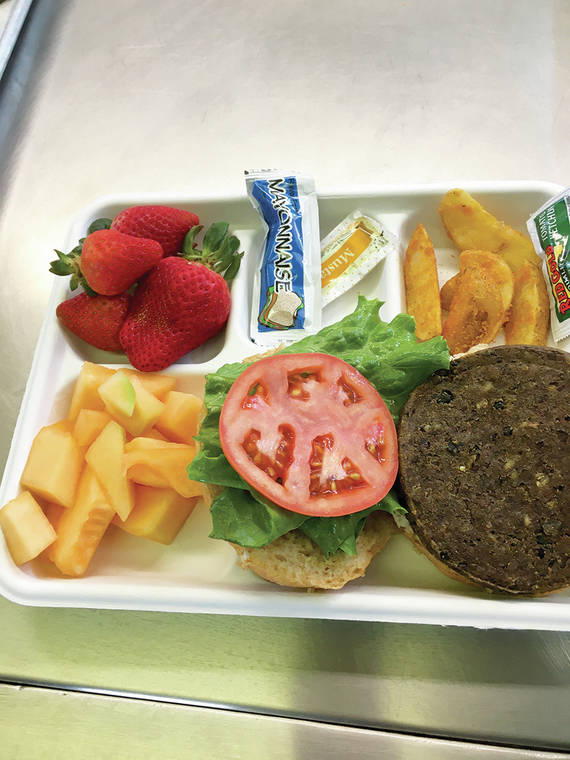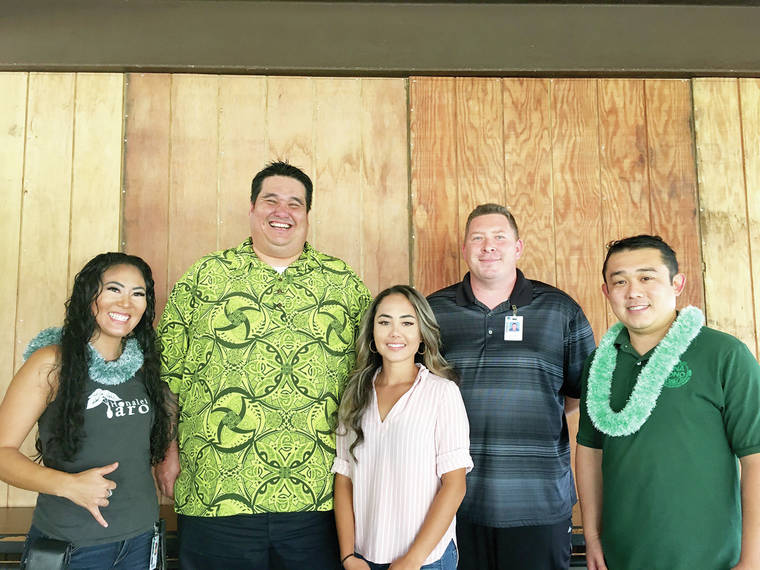KAPA‘A – On Tuesday, a group of Kapa‘a High School’s agriculture students got to taste a taro burger from a local farm as part of the “Farm to School,” program which pairs the Department of Education with local farmers to supply ingredients for school lunches.
Last Spring, KHS’s agriculture science teacher Kylie Hashizaki took her students to the Hanalei Taro &Juice Co. farm in Hanalei. They got to see how taro is grown and how it is manufactured into products like the taro burger.
Hashizaki says she believes it’s beneficial for her students, especially those who are apart of the Future Farmer’s America program, to support local farmers and learn where their food came from.
“I think this offers students an opportunity to have a healthy school lunch that they know where the products are coming from. I think its great to see and support local products in our cafeteria,” Hashizaki said.
Hashizaki has a personal connection to the agriculture industry — she grew up on a cattle ranch in Maui and her boyfriend’s family has a cattle ranch that provides beef for the new company Hawai‘i Meats – a partnership spearheaded by Kaua‘i rancher Bobby Farias and a rancher from Idaho.
They also provide meats for the DOE school systems.
Hashizaki encourages parents to support bringing local products into the school system.
“Rest assure your kids will get a healthier lunch,” she said.
Now after four months of planning, the kids got to taste the taro burgers.
Agriculture students Liliana Perry and Keinan Kawaihalau-Alejo were excited to try it and gave their honest thoughts:
“It’s different, sort of taste like taro but it taste really good,” said agriculture student Keinan Kawaihalau-Alejo.
Fellow ag student Liliana Perry was excited about the veggie alternative.
“It’s a little smaller than the ones in the restaurants but I think its good. I personally don’t eat meat, so it’s really nice, because I can’t always get lunch from school,” Perry said.
Both students are in the Future Farmers of America program.
“I may go into the agriculture field, we are passionate about agriculture but I am still not sure. Generally speaking, I would like a career in science,” Perry said.
“If I were to pursue as a higher education or career wise I would learn about animal, science and veterinarian medicines because I have a deep love for animals and my community,” Kawaihalau-Alejo said.
The KHS farm to school program was coordinated by DOE’s Aina Pono Coordinator or Farm to School Coordinator Dexter Kishida.
“The district is looking to being able to offer more vegetables and vegan items to our students. But also definitely trying to incorporate more local,” Kishida said.
He continued: “We love finding local products. Not only raw local products like kalo. But also manufactured local products. So definitely reach out to Hawaii DOE.”
One of those Kauai companies supplying ingredients to the DOE is the Haraguchi Farm, owner o Hanalei Taro &Juice Co. Kishida said that the DOE is looking to try more products from Hanalei Taro &Juice Co. like the kulolo and the taro hummus.
“Maybe a kalo loco moco, you never know. Kulolo is really cool, and the taro hummus is something we are looking into. For the USDA taro is considered a whole grain or a starchy vegetable,” Kishida said.
Lyndsey Haraguchi-Nakayama, the co-owner and education administrator of Hanalei Taro &Juice Co., is excited about the partnership with DOE’s Kapaa High School’s cafeteria program.
“I met Dexter and I think my parents met him and that’s how things came about. I reached out to him four or five months ago. I am excited because this supports local farmers and provides healthy and enjoyable meals for the keiki,” Haraguchi-Nakayama said.
Haraguchi-Nakayama says that her farm’s education program has been teaching across the state and beyond about sustainability and farmers for over 36 years.
When people buy their products, like the taro burger, all proceeds go back into their non-profit’s two programs: the family farm’s education program and the restoration program that was inspired by the 2018 flood.
Hanalei Taro &Juice Co., has a 501 (c) 3 non-profit called “Ho’opulapula Haraguchi Rice Mill Nonprofit Museum which gives back into educating and restoring the community.
“We are still recovering from the 2018 floods. We are an isolated state. We have natural disasters. So if anything happens we can support the local farmers so they can maintain and grow,” Haraguchi said.
The overall taste of the taro burger was given thumbs up from the agriculture students. Principal Tommy Cox was thrilled at the response.
“Besides eating good food, it’s a good opportunity for our students to learn about sustainability and learn more about local products,” Cox said.
The cafeteria manager Matthew Woods who runs both the middle school and high school temporarily agrees with the principal.
“I’m new to this school, and work at the middle school too temporarily. It’s good to just be involved with gathering farm to table products in here. The kids will get more sustainable local product and less from the mainland,” Woods said.
KHS’s parent-community networking center facilitator Nancy Borilez makes the connection of the farm to table movement to their agriculture program.
“I’m excited about the farm to table program. You hear it in restaurants; there is a big movement for that. Farmer’s market too. We support all that. The taro is in our back yard, so making that connection from farm to school is exciting,” Borilez said.








